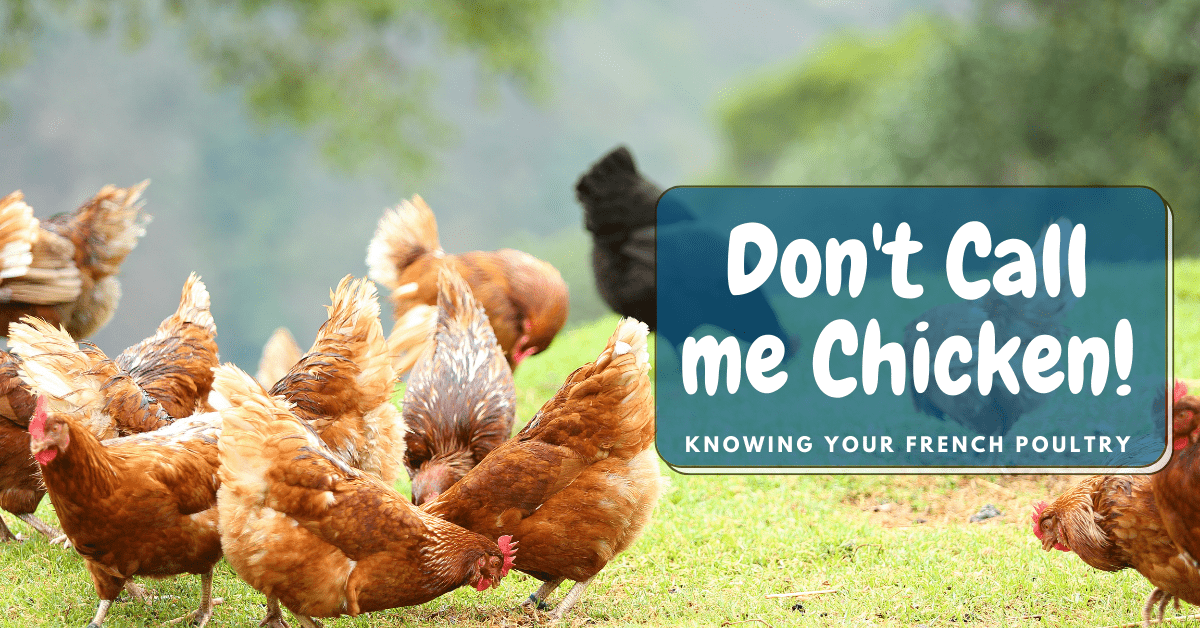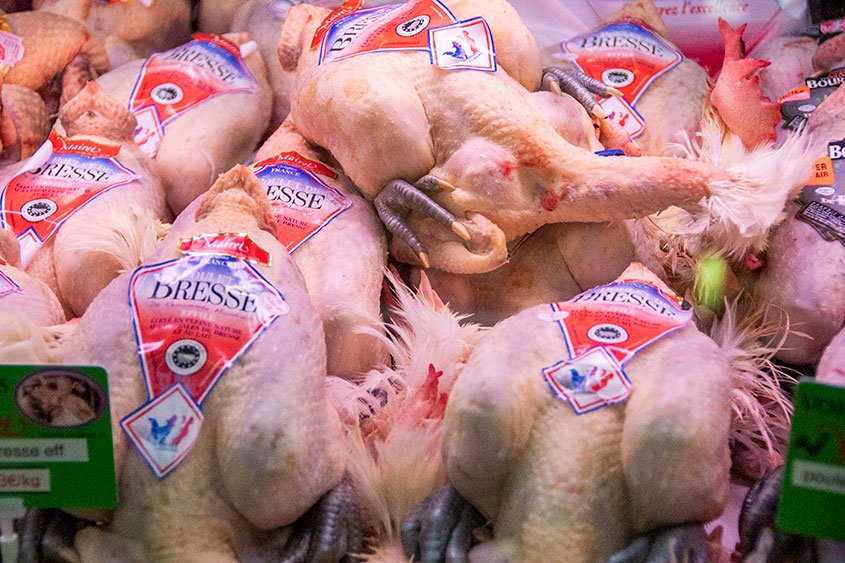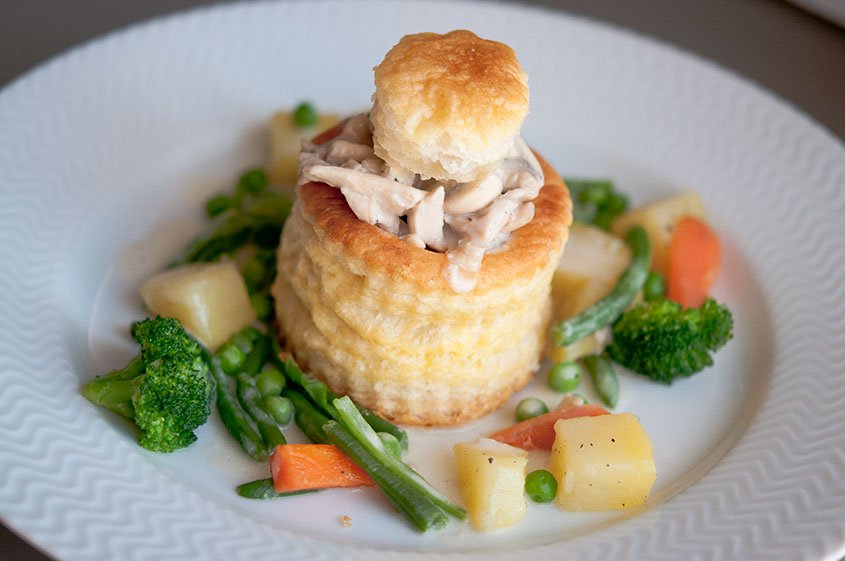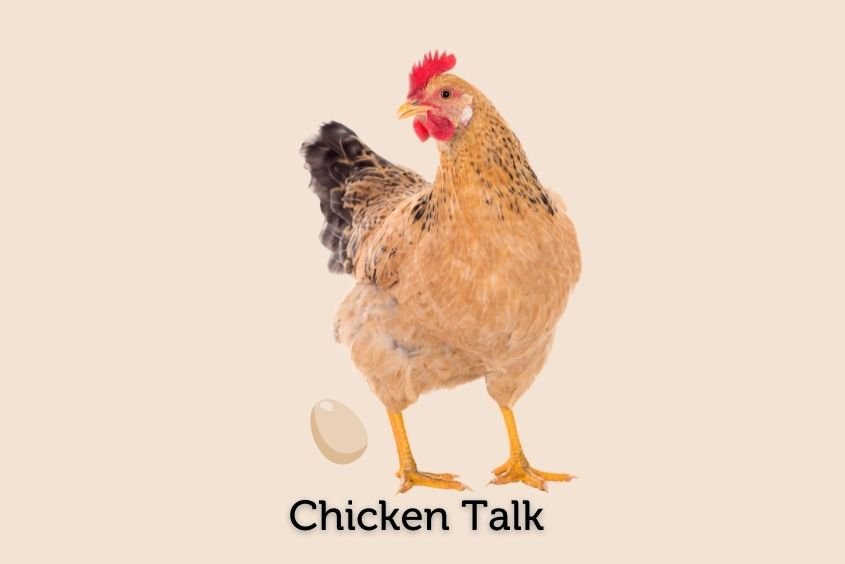
Don’t call me a chicken! Knowing your French Poulets
French Mother: What do you want for dinner, Her son?
French son: Chicken!
French Mother: Oui mais, what kind of Chicken?
Ever been to a French market and find yourself confronted by the variety of poultry you find let alone the variety of chickens. Ever asked yourself why are French chickens yellow? We’ve already armed you with some knowledge to help when navigating the French market. And everyone knows about all the good reasons to shop on Market Day in France.
So now it’s time to have a chat about your poultry. Ah yes! At a French market, everyone has his or her job. The fromager sticks to cheese, the boucher sticks to meat (cow, pork, lamb, etc), the poissonier sticks to fish and seafood, and the volailler is where you’ll head to for your birds. Sometimes there will be a crossover – a butcher for example may also sell you poultry. To help make you an expert in buying chicken in France here is some great information:
Fancy Feet
Un Poulet a pattes bleues ou noires ou blanches ou jaunes ? (a chicken with blue, white or yellow legs?).
At some butcher shops like the one we go to when we do the market visit as part of our French Market class at our Paris school in Montmartre, you have 3 or 4 chickens to choose from, and when Christmas arrives even 6 or 7 varieties.
Poulet de Bresse: White feathers, blue legs
Yellow chicken: Yellow skin, yellow legs,
White chicken: White skin, choice of black legs (Firm meat) or white legs (tender meat)
Varieties (race) of Chickens

Un poulet jaune ou un poulet blanc (a yellow chicken or a white chicken)
A yellow chicken is fed with Corn, so it gets its yellow color skin and meat from the yellow corn. A white chicken is normally fed with wheat and cereals. They are both good chicken, with no difference in quality but a slight difference in flavor. There is however another difference between these two birds: the yellow chicken is less fatty than the white chicken after being cooked, as the yellow fat ”burns and melts” faster during the cooking time.
Une poule: When the female chicken can no longer lay eggs, the meat gets a little tougher and it needs to be boiled longer. According to French history, a dish ”La poule au Pot” was made famous by Henry IV, asking that ”any worker (he said laboureur, someone who works in the field) in France can have a poule au pot on their table every Sunday”. Times were hard and the meat was rare on the table. Today it is not so easy to find une poule at the market, as the old chickens, poules or coqs (roosters), go to the fast-food industries, where tenderness does not matter.
Une Pintade (Guinea Fowl): My bird of choice for a Sunday roast. Juicy, tasty, tender and affordable, and a bit fattier, than a regular chicken with darker meat, and a light game flavor. This beautiful and colorful feeder bird is originally from Africa where you can find them in the wild still. Popular and prestigious food for the Pharaos, the Greeks and the Romans, which was introduced in France by the Romans. It can be used in all the recipes where you normally use a chicken.
Une poule faisanne: Wild female pheasant is poultry with firm dark meat, could be dry sometimes if not properly cooked, but very flavorful. Only available in the fall when hunting season is open. I once saw one crossing a departmental road in front of a friend’s house. Clearly, this was a farm-raised pheasant released for sport and she was on the run!
Une poularde: Female chicken, that has not laid eggs yet. She received rich quality feed for at least 120 days, so it is a very expensive bird, for a special event like Christmas.
Un chapon: Same as the Poularde but for a male chicken, it is a rooster who has been castrated, yep, not cool. Fed with milk and cereals. It is real delicacy. Again pretty expensive; this was the bird that graced all the kings’ tables. You can also find a lot of restaurants and auberges (inns) named ”Au Chapon Fin” a prestigious bird, a prestigious name for a restaurant. Replace the classical Christmas turkey with a French Christmas dinner using a chapon and you will be in heaven. 75 % of the chapons raised are being sold around Christmas.
Un poulet de Bresse: The Rolls Royce of French Chicken, white feathers, ”Blue” legs, always free-range, fed with white corn, bread, and milk for 4 months at least. They will be raised in groups of 20 females and one rooster together maximum per field. It is the most expensive chicken, weight 4 to 5 pounds for more than 50 euros. The classical recipes for this chicken involve cream, white wine, and morels. A classic from The famous Paul Bocuse restaurant in Lyon.
Le Coq – While obviously not a hen, the rooster can not be forgotten in this mix. The symbol of France, the emblem you see just about everywhere. You won’t easily find one at the market even in France, though to our grand surprise, we did once purchase a chicken during our Let’s Eat The World (Cook’n With Class Experiences), Week in Paris culinary tour to make the world-famous coq au vin. While we had expected this beast to be tough, it actually was rather tender. But if you can’t get your hands on a rooster, you can always use a chicken as most places do.
Et oui, en France when you say chicken you better be precise as there is not only one chicken in the store.
Expressions using Poule in French
Sure you can just call someone chicken in English, and you’re all done but the French have a way of using words that is as much sport as it is art. For fun, I took the time to include some of the great and sometimes funny expressions in French using involving poultry. So get ready for some street talk and up your French skills while you’re at it. I left the definitions in French before translating them into English as sometimes you lose something in translation
- Une poule: prosaïquement, une prostituée ou plus familièrement, une petite amie. Prosaically, a prostitute or more familiarly, a girlfriend.
- Une poule de luxe (péjoratif): courtisane, maîtresse. (pejorative) : courtesan, mistress.
- Une poule mouillée: individu craintif. A wet chicken – a fearful individual
- la poule aux œufs d’or: source de richesse inépuisable (d’après la légende d’une poule qui pondait tous les jours un œuf en or). Tuer la poule aux œufs d’or : en référence à La Fontaine, gâcher une fortune à venir pour un profit immédiat. the golden goose: a source of inexhaustible wealth (according to the legend of a hen who laid a golden egg every day). To kill the goose that lays the golden eggs: in reference to La Fontaine, to waste a fortune to come for immediate profit.
- Être une mère-poule/Être un père ou un papa poule: être très maternante/être très couvant, parents excessivement protecteurs. To be a mother hen/to be a father or a father hen: to be very maternal/to be very brooding, excessively protective parents.
- Avoir la chair de poule: au propre, horripilation, au figuré, avoir peur (provient de la similitude d’aspect que prend la peau humaine quand elle a froid, avec la peau d’une poule qui vient d’être plumée). “To have chicken flesh”. To have goose bumps: literally, to be horrified, figuratively, to be afraid (comes from the similarity in appearance that human skin takes on when it is cold, with the skin of a chicken that has just been plucked).
- Avoir la bouche en cul de poule: mimique caractérisée par un arrondissement des lèvres, parfois pour montrer le dédain. To have the mouth pursed like a hen’s ass: mimic characterized by a rounding of the lips, sometimes to show disdain. Our friend Olivier Giraud often makes reference to this in his one-man show, How to Become a Parisian in 1 Hour
- Quand les poules auront des dents: se dit quand un évènement n’est pas près de se réaliser, par extension: jamais. En tchèque, l’expression devient Quand le coq pondra des œufs. When chickens have teeth. (When the chickens get their teeth): said when an event is not about to happen, by extension: never. In Czech, the expression becomes Quand le coq pondra des œufs.
- Pied-de-poule: type précis de petit motif géométrique sur des tissages (en plus grand : pied de coq). The words mean chicken feet but you would translate this as houndstooth: a specific type of small geometric pattern on weavings (larger: rooster’s foot).
- La poule-au-pot: plat à base de poulet cuit à l’eau dans une marmite, et dont le roi Henri IV voulait que chacun puisse profiter au moins une fois par semaine. a dish made with chicken cooked in water in a pot, which King Henry IV wanted everyone to enjoy at least once a week.
- Ça roule, ma poule: Expression paronymique populaire qui dénote une certaine forme d’affection ou d’amitié, et qui signifie tout simplement que tout va bien. Popular paronymic expression that denotes a certain form of affection or friendship, and simply means that everything is fine.
- La poule est la meilleure solution que les œufs ont trouvé pour se reproduire: réponse humoristique à la question de savoir qui de la poule ou de l’œuf a donné naissance à l’autre. The hen is the best solution the eggs have found for reproduction: humorous answer to the question of who gave birth to the other, the hen or the egg.
- Un nid-de-poule: trou dans la chaussée, par référence au trou creusé par la poule non pour pondre mais pour se poudrer de sable et éliminer ses parasites. Pothole: a hole in the road, referring to the hole dug by the hen not to lay eggs but to powder herself with sand and eliminate her parasites
- Cul de poule: récipient hémisphérique utilisé en cuisine. a hemispherical container used in cooking. In other simpler words, a mixing bowl.
- Être comme une poule qui a trouvé un couteau: perplexe, comme devant un objet dont on ignore l’usage. To be like a hen who has found a knife: perplexed, as if faced with an object whose use is unknown.
- Un Lait de poule: est une boisson à base de lait, de crème, de sucre et de jaune d’œuf. a drink made from milk, cream, sugar and egg yolk.
- Se lever et se coucher avec les poules: se lever tôt et se coucher tôt. Get up and go to bed with the chickens: to get up early and go to bed early.
- Une cage à poule: appartement de petite taille, dans un grand ensemble immobilier. A hen cage: a small apartment in a large housing complex.
Expressions avec poulet, poulette, cocotte
- Les poulets: surnom courant donné aux policies. Slang term used to refer to the police
- Mon poulet, ou ma poulette: termes affectueux désignant un petit enfant. Affectionate term used to refer to small children
- Cocotte: En parlant aux petites filles, on utilise souvent le mot cocotte (poule) pour parler affectueusement. When talking to little girls, we often use the word cocotte (chicken) to speak affectionately.
Expressions related to chicken:
- Couver quelque chose: tomber malade, préparer insidieusement une maladie, se sentir patraque. Picture the hen on her eggs waiting for them to hatch. That’s you on the edge of getting sick. to get sick, to prepare insidiously for an illness, to feel wretched.
Learn more about selecting the best poultry during your next French market class in Paris. See you there.
v


